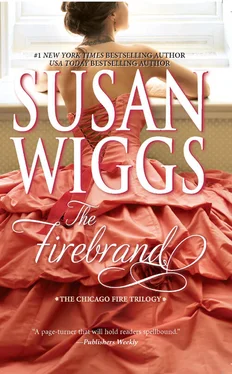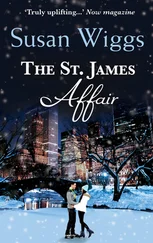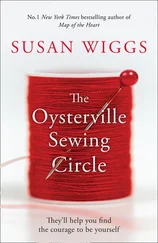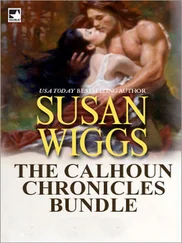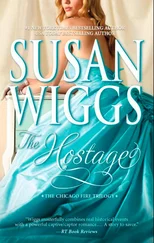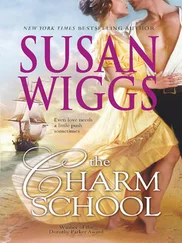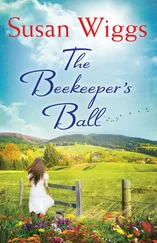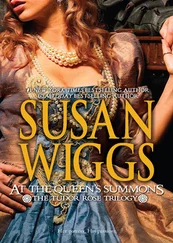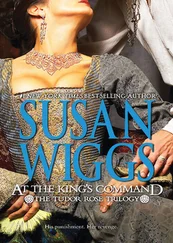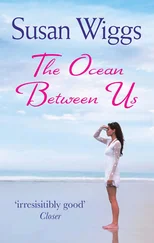1 ...6 7 8 10 11 12 ...18 “The flames are moving faster than a person can run.” Phoebe craned her neck and shouted over the stacked bundles in the wagon, “Driver, do hurry! The fire is closing in!”
“I can’t go any faster than the crowd in front of me,” he yelled in a hoarse voice, ragged from the smoke.
The closer they came to the lake, the denser the mob grew. The river was choked with boats and barges trying to get out onto the open water. The taller ones couldn’t clear the bridges, and many caught fire as they waited for the bridges to rotate. As Lucy watched, a boy climbed the rigging of a sloop and scrambled up to the bridge, hoisted by someone in the crowd. But for the most part, people stampeded across in heedless terror, dropping things along the way, pushing strangers aside in ruthless terror.
Lucy’s father, Colonel Hiram B. Hathaway, always said that a disaster brought out the best and worst in people, and she realized that she was witnessing the truth of it—timid men performing acts of heroism, pillars of society trampling the wounded in their haste to get to safety.
Her parents lived in the tree-shaded splendor of an elegant neighborhood to the north, but that didn’t mean her family was safe. Aggressive, blustering and imperative, the Colonel, as he was known even though he was retired, had a public spirit that would not rest. If the city was burning, he was bound to launch himself into the thick of things.
A decorated war veteran, he was an expert in ammunition and explosives. This would make him particularly useful to those in charge of fighting the fire. The fire companies had resorted to blowing up the buildings in the path of the fire, robbing it of fuel. No doubt the Colonel would be directing the operations, his bewhiskered face ablaze with energy as he planned strategy to battle the flames.
In the midst of danger and mayhem, the thought of her father brought Lucy a needed measure of fortitude. Though he often grew exasperated with his outspoken daughter, the Colonel never treated her with anything less than respect. From a long line of old New England blue-bloods, he was a gentleman to his core. He’d attended West Point, married the most socially prominent girl in Chicago and had distinguished himself in battle at Kenaha Falls, Bull Run and Vicksburg.
But as she grew up, Lucy came to realize that his love and devotion to her and her mother manifested itself in a protectiveness so fierce it was stifling. The Colonel tried to shield his daughter from everything—hunger, hurt, ugliness. He didn’t understand that, in protecting her from what he considered life’s ills, he was walling her off from life itself.
When she asked after the state of his business affairs, he would brush aside her queries, declaring that she needn’t worry her pretty head about such vulgar matters. While her mother was ready enough to accept his patronizing ways, Lucy was indignant.
“For one thing,” she once said to him, “my head is not pretty. For another, I can decide for myself what is worrisome and what is not.”
Yet for all their differences, they shared a deep love and respect for each other, and Lucy said a silent prayer for her father’s safety.
Reflecting on the evening at the Hotel Royale, she felt more foolish than ever. Of all the social outrages she had committed, tonight’s faux pas had been the worst. When people looked back on this date, they would recall it as the night Chicago had burned to the ground.
But not Lucy. For the rest of her life, she would remember a far different disaster—this was the night she had brazenly propositioned a married man.
“Did you see what Mrs. Pullman was wearing?” Diana asked as she and Rand left the Hotel Royale. Brushing impatiently at a flurry of sparks that flew around the hem of her gown, she added, “Her jewels were positively vulgar. She wasn’t nearly as vulgar as that snippy little suffragist you were entertaining, though. If not for her family name, she’d be a pariah, wouldn’t she, Randolph?”
Knowing she didn’t expect a response, Rand tucked her hand more firmly into the crook of his arm and scanned the roadway. They had only been in Chicago for a short while, so he was unfamiliar with the city. But the streets were laid out in a neat grid, and he knew they had to head north to Water Street, where Sterling House was located.
An express wagon rattled by, but the driver ignored Rand’s raised arm. A few hansom cabs, crammed with occupants, passed them without slowing. “We’re wasting time trying to hire a ride,” he said. “We’d best go on foot.”
“Don’t be ridiculous, Randolph. I never walk anywhere.” She drew her mouth into the sweetest of pouts. “Let’s wait until something returns to the livery stables.”
He clenched his teeth in frustration. On the one hand, he didn’t want to alarm her about the fire. But on the other, he wanted her to understand the need to hurry. They had to get to their daughter and make sure she was all right.
The one option he never considered was leaving Diana. He’d sling his wife over his shoulder like a caveman if he had to, but he would never leave her. “We’re walking,” he finally said, pulling her along. “You can yell at me on the way.”
Diana apparently decided that silence was a better punishment. She didn’t speak to him, though she clutched his arm and leaned on him every few steps. Her fashionable, imported shoes were unsuited for walking any distance.
It was just as well she didn’t speak, for he wasn’t all that kindly disposed to his wife at the moment. He’d counted on her to stay with Christine. Instead, she’d grown bored and joined him at the lecture. Some men might have been flattered, but Rand knew Diana all too well. She hadn’t come looking for him. She’d come seeking a diversion from her boredom and had left their daughter in the care of someone they barely knew. Becky Damson seemed a fine young woman, but he had learned long ago not to trust appearances.
After this night was over, Rand decided, he would find a way to turn Diana’s attention and enthusiasm to the needs of her family. He wasn’t certain how to go about it. Some women derived fulfillment from their duties as wives and mothers. He’d seen it himself, though not in his own mother.
The memory ignited a bitterness in Rand that never seemed to mellow. When he was ten years old, Pamela Higgins had walked away from her husband and young son, never to return. Rand had been raised by Grace Tem-pleton Higgins, his paternal grandmother.
But his mother’s departure had left a hidden wound in his soul that he’d carried around all his life. When he’d started a family of his own, he had sworn he would never have the sort of wife who would abandon her family.
A blast sounded in the next block, and a fountain of sparks mushroomed in the sky. Whipping off his frock coat, Rand covered Diana’s head and shoulders with it. She huddled close against him, and despite their annoyance at each other, he felt a surge of tenderness toward her.
“We’ll be home soon,” he said. “I imagine it’s only a few more blocks.”
“That’s what you said a few blocks ago.”
Another blast ripped through the neighborhood, tearing the awnings from buildings and leaves from the few trees still standing. In the smoky distance, Rand made out a crew of militia men with a two-wheeled cart loaded with explosives.
“What on earth is happening?” Diana asked.
“They’re blasting away buildings to create a firebreak.”
In the road ahead, the fire spun and whirled across rooftops. His gut tightened, and he quickened his pace. His instincts screamed for him to run toward his baby daughter, but he couldn’t leave Diana.
Читать дальше
